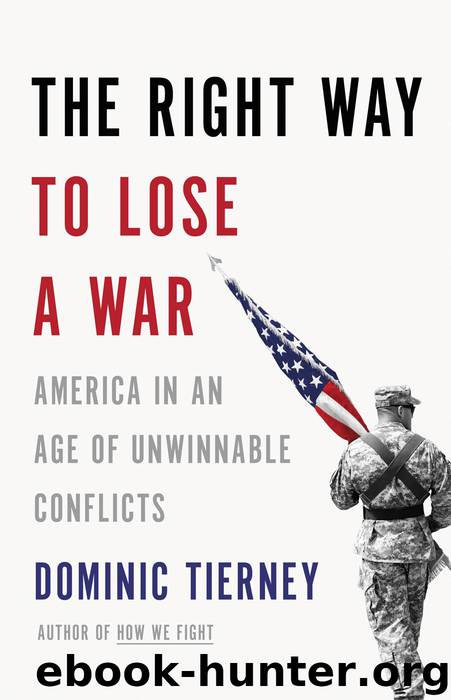The Right Way to Lose a War: America in an Age of Unwinnable Conflicts by Dominic Tierney

Author:Dominic Tierney [Tierney, Dominic]
Language: eng
Format: epub
Tags: Political Science / American Government / General, Political Science / American Government / National, Political Science / American Government / Executive Branch, Political Science / American Government / Legislative Branch, Political Science / International Relations / General, Political Science / Security (National & International)
ISBN: 9780316254885
Amazon: 0316254886
Publisher: Little, Brown and Company
Published: 2015-06-01T22:00:00+00:00
Abdul Sattar Abu Risha pictured in 2007 (Curt Cashour, U.S. Army photo)
The Awakening removed the majority of Sunni insurgents from the battlefield and broke the cycle of violence. The new recruits were invaluable. They knew where the remaining rebels were and how to beat them. After all, they’d been fighting American soldiers for years. It wasn’t a smooth process; Al Qaeda killed Sattar in September 2007. But Anbar came back from the brink of anarchy. In combination with the surge of U.S. forces, the effect was dramatic. By the end of 2007, the number of attacks in Anbar had fallen by over 90 percent.20
The Awakening movement is a stark reminder of the value of peace talks during an exit strategy from war. “Many consider negotiations as a sign of weakness,” wrote Kissinger. “I always looked at them as a weapon for seizing the moral and psychological high ground.… It is a device to improve one’s strategic position.”21
Negotiations have helped to resolve seemingly intractable civil conflicts, like in El Salvador, Cambodia, Guatemala, Bosnia, South Africa, and Northern Ireland. Over time, many extremist rebel groups have transitioned to normal politics by swapping the Kalashnikov for the teleprompter, including Sinn Féin in Northern Ireland and the Palestine Liberation Organization.
Even if success in peace talks proves elusive, the act of negotiating can provide useful intelligence about the insurgents’ organization, capabilities, and goals. If a good-faith effort at diplomacy falters in the face of enemy intransigence, this may boost international and domestic support for a continued war effort. And declaring a willingness to talk is a potentially risky move for the insurgents—undermining their narrative of certain victory.
The ethical price of negotiating must be balanced against the moral cost of not talking. Holbrooke said he had no qualms about bargaining with people who act immorally. “If you can prevent the deaths of people still alive, you’re not doing a disservice to those already killed by trying to do so.”22
Sometimes we shouldn’t talk to the enemy, for example, if they’re utterly extreme or intransigent. Churchill was right not to negotiate with Hitler. But these are very rare exceptions. Usually, in the wake of a military fiasco, we should aggressively look to make a deal—even an ugly deal—to limit the damage.23
After battlefield failure, when should we start talking? Negotiations ought to begin fairly quickly, in parallel with the strengthening of American forces. In other words, the military surge should be accompanied by a diplomatic surge. The idea is to bargain when U.S. force levels are at their peak and Washington has maximum leverage. If we wait until our troops withdraw, the enemy has an incentive to sit on its hands. As Kissinger put it: “You should never be negotiating a peace when the opposing force knows you are leaving.”24 Unfortunately, in Afghanistan, Washington only embraced a diplomatic solution in 2011 when American strength was receding.
In summary, following a military fiasco, peace talks are a difficult but necessary path. With American soldiers fighting and dying in a campaign of limited interests, we can’t afford to cling to a good-versus-evil view of the war.
Download
This site does not store any files on its server. We only index and link to content provided by other sites. Please contact the content providers to delete copyright contents if any and email us, we'll remove relevant links or contents immediately.
The Secret History by Donna Tartt(19058)
The Social Justice Warrior Handbook by Lisa De Pasquale(12187)
Thirteen Reasons Why by Jay Asher(8894)
This Is How You Lose Her by Junot Diaz(6877)
Weapons of Math Destruction by Cathy O'Neil(6267)
Zero to One by Peter Thiel(5789)
Beartown by Fredrik Backman(5737)
The Myth of the Strong Leader by Archie Brown(5500)
The Fire Next Time by James Baldwin(5432)
How Democracies Die by Steven Levitsky & Daniel Ziblatt(5216)
Promise Me, Dad by Joe Biden(5144)
Stone's Rules by Roger Stone(5081)
A Higher Loyalty: Truth, Lies, and Leadership by James Comey(4954)
100 Deadly Skills by Clint Emerson(4921)
Rise and Kill First by Ronen Bergman(4780)
Secrecy World by Jake Bernstein(4742)
The David Icke Guide to the Global Conspiracy (and how to end it) by David Icke(4709)
The Farm by Tom Rob Smith(4502)
The Doomsday Machine by Daniel Ellsberg(4485)
